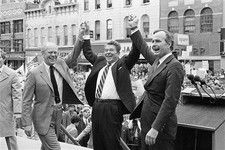A central factor in how Ronald Reagan won the Cold War, and did so with greater support along the way than the current president, was his ability to find means to undermine the enemy without losing thousands of American lives. An intriguing example, one that has eluded history, is the Farewell Dossier.
This top-secret effort was part of the devastating strategy of economic warfare pursued by Reagan and a handful of intimate advisers—a strategy so sensitive that those involved publicly denied that a campaign was underway. A central architect of that effort, National Security Adviser Bill Clark, was confronted on the covert strategy by Soviet Ambassador Anatoly Dobrynin, who whispered to him at a diplomatic function, “You have declared war on us, economic war.†Clark could only answer Dobrynin two decades later, once the Soviet Union imploded: “Yes, we had.â€


Former president Gerald R. Ford, left, lends his support to fellow Republican and presidential candidate Ronald Reagan and running mate George Bush, seen here on the final day of campaigning in Peoria, Ill., in this Nov. 3, 1980, file photo. Ronald Reagan gets more credit than he deserves for winning the Cold War, former President Gerald Ford told his hometown newspaper before his death. The best president of his lifetime, Ford said, was a more moderate Republican: Dwight D. Eisenhower. Ford commented on fellow presidents of the second half of the 20th century during a series of interviews with the Grand Rapids newspaper over more than 25 years, on condition that his remarks be withheld until after his death. (AP Photo, file)
The Farewell Dossier became part of this campaign.
This super-secret initiative was entrusted to an enigmatic NSC staffer named Gus Weiss, who I interviewed several times before he died in November 2003. Nearing the end of his life, Weiss wanted to discuss this effort “that no one knows about.†Here is how it unfolded:
The Reagan administration suspected that Soviet intelligence was stealing critical technology from the West. Not until 1981, however, was an organized Soviet program discovered, when French intelligence obtained the services of a 53-year-old defector named Colonel Vladimir Vetrov. Vetrov became known as “Farewell.â€
Farewell photographed 4,000 KGB documents, fully revealing the Soviet espionage program.
In July 1981, Francois Mitterand—in a rare example of French cooperation in Reagan’s economic war—told Reagan about Vetrov and offered the intelligence to the United States. Reagan gratefully accepted.
Reagan then asked CIA director Bill Casey to consider how to best use Farewell’s material.
That fall, Gus Weiss was cleared to read it.
Weiss learned that the KGB had created a unit called Directorate T, tasked to plumb the R&D of Western nations. Directorate T’s operating arm was named Line X. Through this apparatus, said Weiss, “a master plan†was developed to acquire American high-tech products and know-how.
The material Weiss read confirmed his worst nightmares: Line X had been so successful, said Weiss, “that the Soviet military and civil sectors were in large measure running their research on that of the West, particularly the United States.†Radar, machine tools, semiconductors—much of which went into Soviet defense.
Colonel Vetrov spilled the beans on Directorate T, divulging the names of over 200 Line X officers stationed throughout the West and more than 100 leads on Line X activities.
Weiss planned an ingenious response: Thanks to Farewell, Reagan’s NSC was in possession of a Line X shopping list of Soviet-needed technology. Weiss offered a suggestion: U.S. counter-intelligence could supply some of these technologies, but with a fatal catch: the products would appear genuine but would prove defective.
| |

Bookmarks